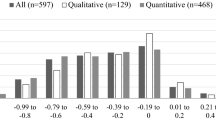Abstract
Significant difference between response to real and hypothetical valuation questions is often referred to as hypothetical bias. Some economists have had success with using “cheap talk” (which entails reading a script that explicitly highlights the hypothetical bias problem before participants make any decisions) as a means of generating unbiased responses in a referendum format. In this article, we test the robustness of cheap talk using a voluntary contribution mechanism with a provision point over a wide range of possible payment amounts. Our results confirm the existence of hypothetical bias, and suggest that cheap talk may eliminate hypothetical bias, but only for respondents facing higher payments.
Similar content being viewed by others
References
D. Aadland A.J. Caplan (2003) ArticleTitleWillingness to Pay for Curbside Recycling with Detection and Mitigation of Hypothetical Bias American Journal of Agricultural Economics 85 IssueID2 492–502
K. Arrow R. Solow P. Portney E.E. Leamer R. Radner H. Schuman (1993) ArticleTitleReport of the NOAA Panel on Contingent Valuation Federal Register 58 IssueID10 4602–4614
R. Berrens H. Jenkins-Smith A. Bohara C. Silva (2002) ArticleTitleFurther Investigation of Voluntary Contribution Contingent Valuation: Fair Share, Time of Contribution, and Respondent Uncertainty Journal of Environmental Economics and Management 44 IssueID1 144–168
T.C. Brown I. Ajzen D. Hrubes (2003a) ArticleTitleFurther Tests of Entreaties to Avoid Hypothetical Bias in Referendum Contingent Valuation Journal of Environmental Economics and Management 46 IssueID2 353–361
T.C. Brown I. Ajzen D. Hrubes (2003b) ArticleTitleFurther Tests of Entreaties to Avoid Hypothetical Bias in Referendum Contingent Valuation Journal of Environmental Economics and Management 46 353–361
P.A. Champ R.C. Bishop T.C. Brown D.W. McCollum (1997) ArticleTitleUsing Donation Mechanisms to Value Nonuse Benefits from Public Goods Journal of Environmental Economics and Management 33 IssueID2 151–162
J. Clark (2002) ArticleTitleHouse Money Effects in Public Good Experiments Experimental Economics 5 IssueID3 223–231
R.G. Cummings S. Elliott J. HarrisonG.W. Murphy (1997) ArticleTitleAre Hypothetical Referenda incentive Compatible? Journal of Political Economy 105 IssueID3 609–621
R.G. Cummings G.W. Harrison L.L. Osborne (1995a) Can the Bias of Contingent Valuation Surveys Be Reduced? Economics working paper Division of Research, College of Business Administration, University of South Carolina. Columbia, SC
R.G. Cummings G.W. Harrison E.E. Rutstroüm (1995) ArticleTitleHomegrown Values and Hypothetical Surveys: Is the Dichotomous Choice Approach Incentive-Compatible American Economic Review 85 IssueID1 260–266
R.G. Cummings L.O. Taylor (1999) ArticleTitleUnbiased Value Estimates for Environmental Goods: A Cheap Talk Design for the Contingent Valuation Method The American Economic Review 89 IssueID3 649–665 Occurrence Handle10.1257/aer.89.3.649
R.G. Ethier G.L. Poe W.D. Schulze J. Clark (2000) ArticleTitleA Comparison of Hypothetical Phone and Mail Contingent Valuation Responses for Green-Pricing Electricity Programs Land Economics 76 IssueID1 54–67
J.A. Fox J.F. Shogren D.J. Hayes J.B. Kliebenstein (1998) ArticleTitleCVM-X: Calibrating Contingent Values with Experimental Auction Markets American Journal of Agricultural Economics 80 IssueID3 455–465
G.W. Harrison E.E. Rutstroüm (2002) Experimental Evidence on the Existence of Hypothetical Bias in Value Elicitation Methods V.L. Smith (Eds) Handbook of Results in Experimental Economics Elsevier Science New York
J.P. Hoehn A. Randall (1987) ArticleTitleA Satisfactory Benefit Cost Indicator from Contingent Valuation Journal of Environmental Economics and Management 14 IssueID3 226–247
R.M. Isaac D. Schmidtz J.M. Walker (1989) ArticleTitleThe Assurance Problem in a Laboratory Market Public Choice 62 217–236
J.O. Ledyard (1995) Public Goods: A Survey of Experimental Research J.H. Kagel A.E. Roth (Eds) The Handbook of Experimental Economics Princeton University Press Princeton, NJ
J. List R.P. Berrens A.K. Bohara J. Kerkvliet (2004) ArticleTitleExamining the Role of Social Isolation on Stated Preferences American Economic Review 94 IssueID3 741–752
J.A. List (2001) ArticleTitleDo Explicit Warnings Eliminate the Hypothetical Bias in Elicitation Procedures? Evidence from Field Auctions for Sportscards American Economic Review 91 IssueID5 1498–1507 Occurrence Handle10.1257/aer.91.5.1498
List J.A. (2004). Young, Selfish and Male: Field Evidence of Social Preferences. Economic Journal 114(January): 121–149
J.A. List C. Gallet (2001) ArticleTitleWhat Experimental Protocol Influence Disparities Between Actual and Hypothetical Stated Values? Environmental and Resource Economics 20 241–254
J.L. Lusk (2003) ArticleTitleWillingness-to-pay for Golden Rice American Journal of Agricultural Economics 85 IssueID4 840–856
M. Marks R. Croson (1998) ArticleTitleAlternative Rebate Rules in the Provision of a Threshold Public Good: An Experimental Investigation Journal of Public Economics 67 IssueID2 195–220
Murphy J.J., Stevens T.H., Allen P.G., Weatherhead D., (2003). A Meta-Analysis of Hypothetical Bias in Stated Preference Valuation. Working paper. Amherst, MA: University of Massachusetts, Department of Resource Economics
J.J. Opaluch K. Segerson (1989) ArticleTitleRational Roots of Irrational Behavior, New Theories of Economic Decision-Making Northeastern Journal of Agricultural and Resource Economics 18 81–95
G.L. Poe J.E. Clark D. Rondeau W.D. Schulze (2002) ArticleTitleProvision Point Mechanisms and Field Validity Tests of Contingent Valuation Environmental and Resource Economics 23 105–131
D. Rondeau W. Schulze G. Poe (1999) ArticleTitleVoluntary Revelation of the Demand for Public Goods Using a Provision Point Mechanism Journal of Public Economics 72 IssueID3 455–470
S.K. Rose J. Clark G.L. Poe D. Rondeau W.D. Schulze (2002) ArticleTitleThe Private Provision of Public Goods: Tests of a Provision Point Mechanism for Funding Green Power Programs Resource and Energy Economics 24 131–155
L. Taylor (1998) ArticleTitleIncentive Compatible Referenda and the Valuation of Environmental Goods Agricultural and Resource Economics Review 27 IssueID2 132–139
Author information
Authors and Affiliations
Corresponding author
Additional information
JEL classifications: C9, Q26, H41
Rights and permissions
About this article
Cite this article
Murphy, J.J., Stevens, T. & Weatherhead, D. Is Cheap Talk Effective at Eliminating Hypothetical Bias in a Provision Point Mechanism?. Environ Resource Econ 30, 327–343 (2005). https://doi.org/10.1007/s10640-004-4224-y
Accepted:
Issue Date:
DOI: https://doi.org/10.1007/s10640-004-4224-y




